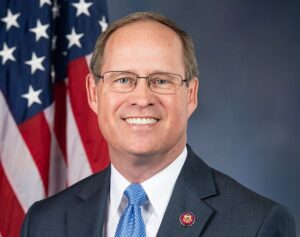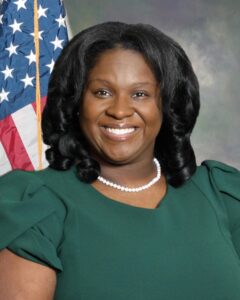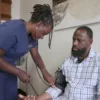Black women working to improve Black maternal health assessed recent successes and new roadblocks to lowering the rate of pregnancy related death at an event in Durham this week.
The discussion took place at a roundtable organized by the Biden-Harris campaign to mark Black Maternal Health Week. The event put a focus on the systemic forces that result in Black women dying of pregnancy-related causes at three times the rate of white women, and on policies that would help keep more Black women alive.
A maternal mortality review report on North Carolina deaths in 2018 and 2019 found that more than 85% of the deaths were preventable, and discrimination was the leading probable contributing factor in nearly 70% of the deaths. Bias and discrimination were defined broadly to encompass not only race or ethnicity, but weight, geography, substance use, history of incarceration, and other factors. The report was published in February.
One development highlighted as a success at the roundtable was the extension of postpartum medical care from two months to a year for people who qualify for Medicaid because they are pregnant. The state extended postpartum care to 12 months in 2022. States were authorized to extend postpartum coverage under Biden’s American Rescue Plan.
Two months of insurance coverage was considered too little to have health care providers address patients’ postpartum depression or heart problems. Disorders in which the heart loses its ability to pump blood are the leading cause of death from six weeks to a year after giving birth, accounting for 1 in 4 maternal deaths. Black and Native American women are at higher risk.
Women didn’t have ongoing care for high blood pressure, diabetes, or other health problems that developed or were discovered after a first postpartum checkup, said Maya Jackson, founder and executive director of MAAME, a community health organization in Durham that helps birthing people of color.
“A lot of times, people didn’t have insurance to figure out what’s going on,” Jackson said.
Roundtable participants criticized North Carolina abortion restrictions enacted last year. The new law is reducing patients’ access to care and harming health, participants said. The Republican-led legislature enacted the law last year over Democratic Gov. Roy Cooper’s veto. The law bans abortions after 12 weeks, with exceptions for rape, incest, the health of the mother, and life-limiting fetal anomalies.
A national survey of OBGYNs conducted by KFF last year found that 64% believed that the U.S. Supreme Court decision overturning Roe v. Wade worsened pregnancy-related deaths, 70% believed it made racial and ethnic inequalities worse, and 55% believed it made it harder to attract new OBGYNs to the field.
The Associated Press reported Friday that staff at Person Memorial Hospital in Roxboro refused to give a pregnant woman complaining of stomach pain an ultrasound. The woman gave birth in a car on her way to another hospital. The baby died. Emergency rooms in states with abortion bans or gestational limits are turning away pregnant women, AP reported.
OBGYNs are leaving the state, widening maternal health deserts, Jackson said. People drive hours to urban areas to give birth or for abortion access.
Threats on the horizon include challenges to diversity, equity, and inclusion programs in medical schools.

U.S. Rep. Greg Murphy, a urologist from Greenville, introduced a bill last month that would “cut off federal funding to medical schools that force students or faculty to adopt specific beliefs, discriminate based on race or ethnicity, or have diversity, equity, and inclusion offices or any functional equivalent,” he said at a news conference. Instruction about health issues tied to race would still be allowed, he said.
“Guys, this is medical school. This is not art school, it’s not English school, it’s medical school,” Murphy said at the news conference.
“I was taught to take care of any patient regardless of the race, ability to pay, their religion or their creed. I was taught to do the same with my colleagues, to treat them with respect — collegiality.”
Murphy gained widespread notoriety in 2020 for a tweet saying then-Vice Presidential candidate Kamala Harris, who is Black and southeast Asian, was chosen “for her color and her race.” He deleted the post after North Carolina Democrats called it out. He told a television station the tweet was supposed to say “color and gender.”
Medical schools have introduced cultural competency education to prepare students to treat patients of different races, religions, and ethnicities.
A 2016 survey of medical students and residents found that half held false beliefs about biological differences between Black people and white people. Those who endorsed those false beliefs thought Black people feel less pain than white people. It led them to make inaccurate treatment recommendations.
Women at the roundtable this week traded stories about inaccurate medical diagnoses.

Nimasheena Burns, vice chair of the Durham County Board of Commissioners, said she saw a doctor for lightheadedness. She looked at her online medical chart and saw her blood was low in iron and that the concentration of iron in her blood had been dropping for years.
“No one ever took a look at it,” she said. After an unsatisfactory appointment with her primary care doctor, she found another doctor who told her she needed an immediate blood transfusion.
Joy Spencer, executive director of Equity Before Birth, said attacks on DEI are traumatic and ignorant.
A 2020 study found that mortality rates for Black newborns dropped precipitously when they had Black doctors. Black babies in the United States are more than twice as likely to die before their first birthdays as white infants.
“Literally, having cultural competence saves our lives,” Spencer said. “When we help people who are the most vulnerable and have the least access to resources, this is going to improve outcomes for everyone.”


